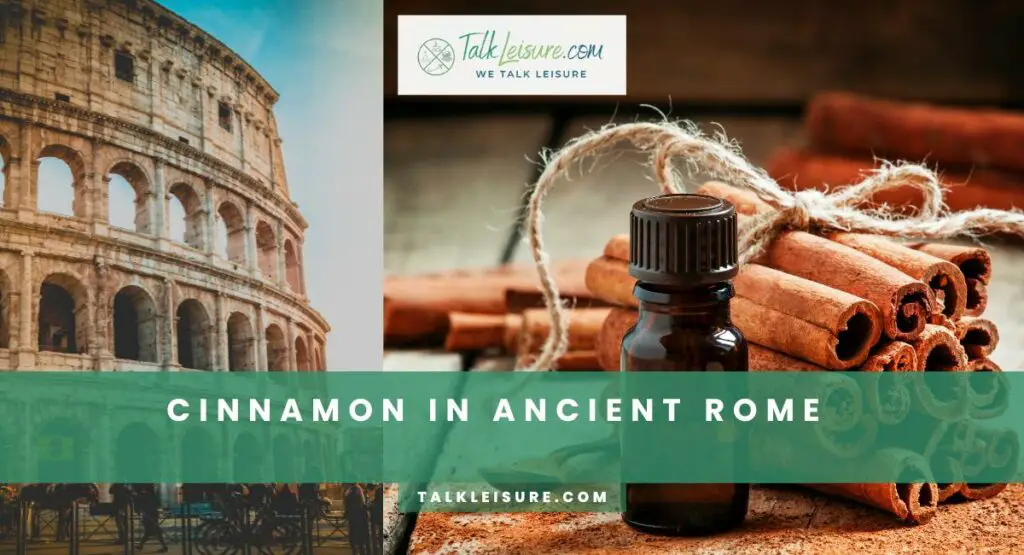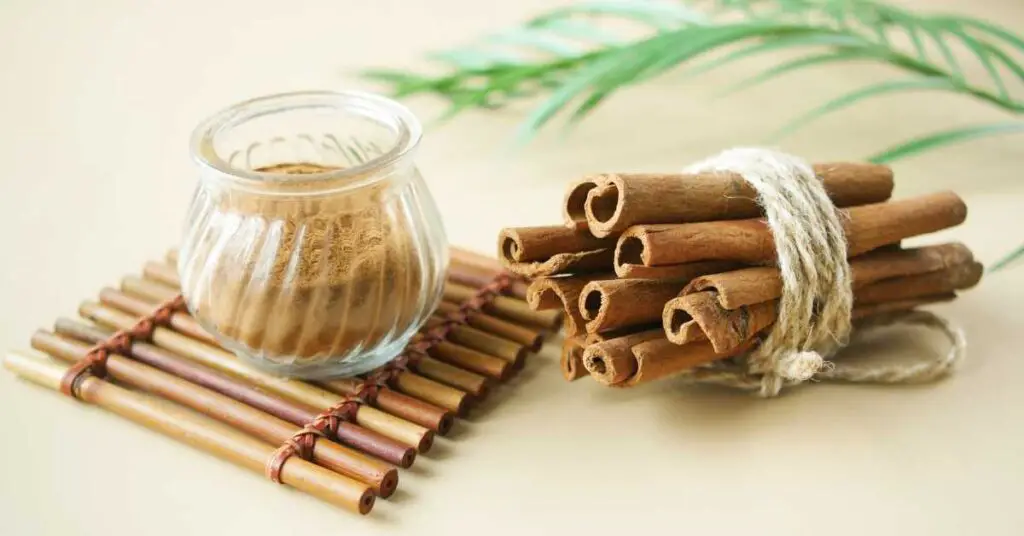In ancient Rome, one of the most valued spices was cinnamon, which was used for both medicinal and aromatic purposes.
The Romans were impressed by cinnamon’s mystical and healing properties and used it in various ways.
In the fascinating story of ancient Rome, cinnamon stands out like a special ingredient in a recipe.
It wasn’t just a spice for tasty dishes; it was like a superstar with a great smell and healing powers.
Imagine using cinnamon not just for delicious meals but also for making perfumes and making people feel better. That’s what the ancient Romans did!
Let’s explore how this excellent spice, cinnamon, became a big deal in people’s lives.
The Ancient Rome

Ancient Rome was one of the most powerful empires in the world, spanning over 1,000 years and leaving a lasting impact on history.
The city of Rome was founded in 753 BCE and eventually grew into a vast empire that extended from the Scottish Highlands in the North to the Sahara Desert in the South.
The Roman Empire was a center of art, science, and architecture, boasting monumental structures like the Colosseum, the Pantheon, and the Forum.
Ancient Rome was also a bustling city of merchants, traders, and artisans, with a complex social structure consisting of patricians, plebeians, and slaves.
The Romans were skilled engineers with sophisticated systems of aqueducts and roads connecting their vast empire.
They also developed a legal system still used in some countries today and made lasting contributions to art, literature, and philosophy.
Despite its eventual decline and fall, the legacy of Ancient Rome continues to be felt today in modern society.
The Secret History Of Essential Oils In Ancient Rome
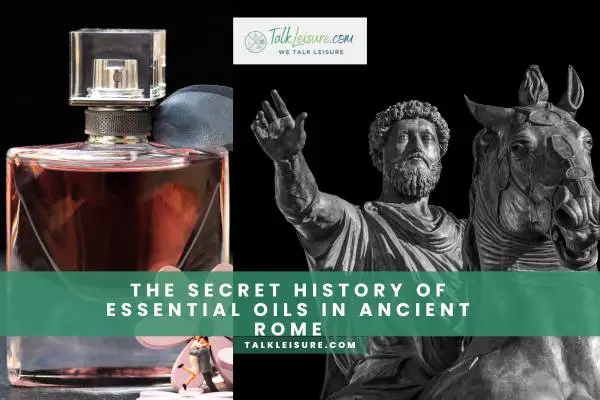
The Romans used various herbs and plants to create perfume and medicinal remedies. Essential oils were a vital part of their daily lives.
The Romans used essential oils in various ways, including aromatherapy, skincare, and religious practices.
They believed these oils had mystical powers and could help cure various ailments.
The use of essential oils was a symbol of luxury and wealth, and they were often gifted to high-ranking officials.
Ancient Romans were big fans of essential oils, using them in various aspects of their lives.
They were serious about cleanliness, regularly visiting public bathhouses where they applied essential oils to their hair, clothes, and skin. Lavender, a favorite, was known for its relaxing and healing properties.
Roman women flaunted signature perfumes from essential oil blends, such as rhodium and “susinum”, to enhance their aesthetic appeal.
Essential oils weren’t just for looking and smelling good; they were also used as medicine. Gladiator wounds were treated with herbs and oils by physicians like Claudius Galen, preventing deaths from injuries.
Popular healing oils included fennel, known for calming nerves and promoting relaxation; elecampane, beneficial for digestion and the immune system; and silphium, a mysterious plant believed to treat various ailments.
Romans incorporated essential oils into their religious practices, fumigating temples with scents like sage, myrrh, frankincense, and cedarwood.
These oils were believed to promote a connection to the gods and offer various health benefits, from reducing anxiety to healing sores.
Ancient Rome And Fragrances
The use of fragrances and perfumes has been traced back to ancient cultures.
Ancient Rome is no exception. Fragrances were an integral part of daily life in ancient Rome, used in many forms, from perfume to medicinal remedies and religious practices.
The Romans believed that fragrances had mystical powers and could heal various ailments. They used various herbs and plants to create perfumes or incense, with cinnamon being a favorite ingredient.
Fragrances were an essential component in people’s lives and a symbol of luxury and wealth.
It was common for high-ranking officials to be gifted fragrances.
The use of fragrances and perfumes was essential to personal grooming and social etiquette.
Today, fragrances are still essential daily and used for various purposes.
The history of fragrances in ancient Rome is a testament to their importance and significance, giving us a glimpse into an age-old tradition that still holds relevance in modern times.
The History Of Perfume: From Ancient Egypt To Modern Times
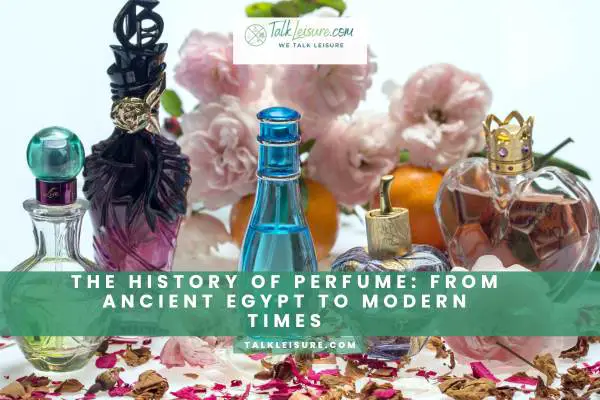
Perfume has been around for a long time, like thousands of years.
It started in ancient Egypt, where they used it for religious ceremonies and personal hygiene, thinking it had magical powers. Even ordinary people used it, and they believed it helped the dead in the afterlife.
Greece and Rome also loved perfume. Greeks thought it had healing powers, while Romans used it to smell nice and avoid evil spirits.
In the Middle Ages, only rich people and clergy could afford perfume, a luxury item showing off status. They used flowers, herbs, and spices to make it.
The Renaissance brought perfume back into fashion for everyone. People used it a lot, mainly because bathing wasn’t typical.
Then came the Industrial Revolution, and perfume could be made on a large scale, making it more affordable. Synthetic fragrances were invented, too, making new scents possible.
Nowadays, perfume is a huge industry worth billions. Perfumers use natural and artificial stuff to make all kinds of unique smells.
You can find perfumes at different prices; new ones always come out. Perfume is not just for smelling good; it’s a part of our history and culture from ancient times to now.
Cinnamon: Mystic Powers Of A Minute Ingredient
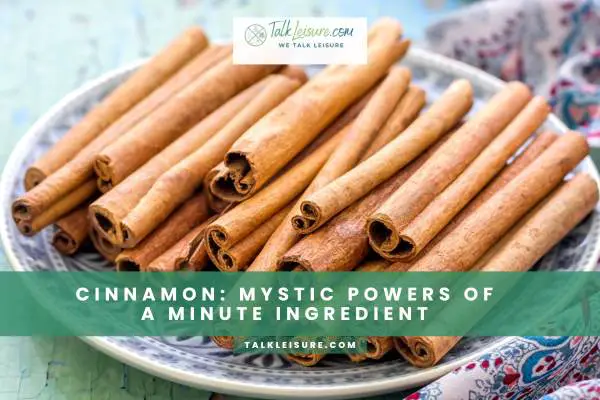
Cinnamon has been cherished for centuries for its incredible aroma and taste.
The spice was used by ancient Romans and Egyptians for various purposes, from perfumes to healing.
In ancient Rome, cinnamon was an essential ingredient in perfumes and was believed to have mystic powers.
The Romans also used cinnamon for medicinal purposes to cure numerous ailments, including stomach issues and respiratory problems.
The incredible health benefits of cinnamon scent are well-known today. Research has shown that cinnamon scent can alleviate stress, improve memory, and promote relaxation. Additionally, cinnamon is rich in antioxidants and anti-inflammatory properties that can help prevent and manage chronic diseases like diabetes and arthritis.
Cinnamon is used as a base note to add depth and warmth to fragrances in perfumery.
Its sweet, spicy aroma is ideal for cold weather and adds a sense of sophistication and elegance to perfumes.
Cinnamon is truly a magical ingredient, both in fragrance and in the healing arts.
The Mystic Power Of Cinnamon
So, Cinnamon isn’t just a tasty spice; it has a long history dating back to 2800 BC when our ancestors used it for various purposes like anointing and treating ailments.
Nowadays, researchers are fascinated by its exotic flavor and aroma.
Antioxidant Power: Cinnamon is like a superhero against harmful molecules in our bodies. It fights off these bad guys, helping keep our cells healthy.
Anti-Inflammatory Action: Think of cinnamon as a peacemaker in your body. It helps calm inflammation, like a bit of fire inside us. Less inflammation means a happier and healthier body.
Cholesterol Control (Antilipemic): Cinnamon seems to be a good friend to our hearts. It can help control cholesterol levels, vital for a healthy ticker.
Diabetes Support (Antidiabetic): If your body is having trouble handling sugar, cinnamon might be like a helper. It could assist in managing blood sugar levels, which is crucial for people with diabetes.
Germ Fighter (Antimicrobial): Cinnamon is like a shield against germs. It has properties that can help fight off bacteria and other nasty invaders, keeping us healthier.
Cancer Fighter (Anticancer): There’s even talk about cinnamon’s potential in the fight against cancer. It might not be a cure, but it could help in som
Did The Ancient Romans Have Cinnamon?

Yes, the ancient Romans had cinnamon. The spice was a beloved and highly prized import from distant lands, including India and Sri Lanka.
The Romans valued cinnamon for its pleasing aroma and taste and its supposed medicinal properties.
They used it to flavor foods, perfumes, and various medicinal remedies.
Cinnamon was so precious in ancient Rome that it was treated like gold and other valuable commodities.
The spice was often used as a currency and gifted to kings and queens.
The Romans believed cinnamon had supernatural powers and could ward off evil spirits, so it was frequently used in religious ceremonies and rituals.
Today, cinnamon remains a popular spice worldwide and is used in various foods, perfumes, and medicinal remedies. Despite its long and fascinating history, the mystical powers of cinnamon remain as elusive as ever.
Was Cinnamon Popular Among The Romans?
Cinnamon was highly valued and popular among the Romans due to its exotic nature and unique properties.
It was seen as a symbol of luxury and wealth, often reserved for special occasions and gifted to esteemed individuals.
The Romans used cinnamon in food, medicine, perfumes, and religious ceremonies.
They believed that it had healing properties and could ward off evil spirits.
Cinnamon was treasured so much in ancient Rome that it was often used as a currency.
The spice was imported from faraway lands and was considered precious, with merchants sometimes risking their lives to obtain it.
Cinnamon was widely used in Roman society, from the imperial palace to ordinary households, and its popularity only continued to grow over time.
Today, cinnamon remains a beloved spice worldwide and is an essential ingredient in many of our favorite dishes and fragrances.
What Was Cinnamon Used For In Ancient Rome?
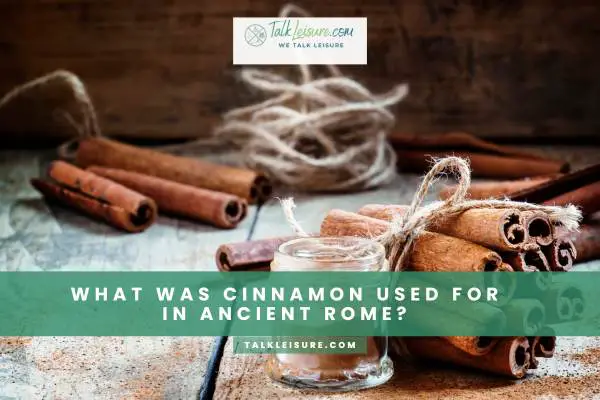
Cinnamon was a highly prized spice in ancient Rome. It was used in cooking, religious ceremonies, perfumes, and medicine.
The Romans believed cinnamon had healing properties and could cure various ailments, such as coughs and digestive issues.
The ancient Romans used cinnamon because they believed it could help stomach and breathing problems. They also used it during funerals to hide the smell of dead bodies.
Around 3000 BCE, people used cinnamon in Egypt to preserve mummies and make things smell and taste better.
The spice was so highly valued that it was often used as a currency, and traders risked their lives to obtain it.
Cinnamon was also a symbol of luxury and wealth, often reserved for special occasions and gifted to esteemed individuals.
Its exotic aroma and unique taste made it a popular ingredient in many Roman dishes, and today it remains a beloved spice worldwide.
| Aspect of Use | Details |
|---|---|
| Culinary Use | – Used as a spice to flavor various dishes and beverages. |
| – Considered a precious and exotic ingredient in Roman cuisine. | |
| Medicinal Use | – Used to treat digestive problems, colds, flu, menstrual cramps, and arthritis pain. |
| – Applied topically as a paste or ingested as tea, tonic, or powder. | |
| – Valued for its healing properties and believed to have fever-reducing abilities. | |
| Perfume Ingredient | – Essential component in Roman perfumes and fragrances. |
| – Combined with other ingredients like myrrh, frankincense, and rose for luxurious scents. | |
| – Served as a symbol of luxury and wealth, often gifted to high-ranking officials. | |
| Religious Practices | – Used in fumigating temples during religious ceremonies. |
| – Believed to promote a connection to the gods and offer health benefits. | |
| Currency | – Highly valued and used as a form of payment for debts, taxes, and even as soldiers’ wages. |
| Social Significance | – Symbolized luxury and wealth; reserved for special occasions. |
| – Worn by both men and women as a signature scent. | |
| Overall Popularity | – Widely used from imperial palaces to ordinary households. |
| – Remained popular and continued to be a beloved spice in Roman society. |
What Was A Perfume Used For In Ancient Rome?
In ancient Rome, perfume was used for its pleasant scent and medicinal and religious purposes.
It was believed that certain scents could cure illnesses and improve one’s well-being, while others could appease the gods during rituals and ceremonies.
Perfumes were made from various sources, including flowers, herbs, and spices, such as cinnamon.
Many different perfumes were available, ranging from rich and complex to light and refreshing, and men and women of all ages used them.
Perfume also had social and cultural significance in ancient Rome.
Wearing a signature fragrance was a way to express one’s style and status.
Wealthy individuals often had their personalized scents, which were created by skilled perfumers and considered symbols of their elevated status.
Overall, perfume was significant in ancient Roman culture, and its importance continued to be felt throughout the centuries.
Why Cinnamon Has Been A Favorite Spice Of Humans For 1000s Of Years
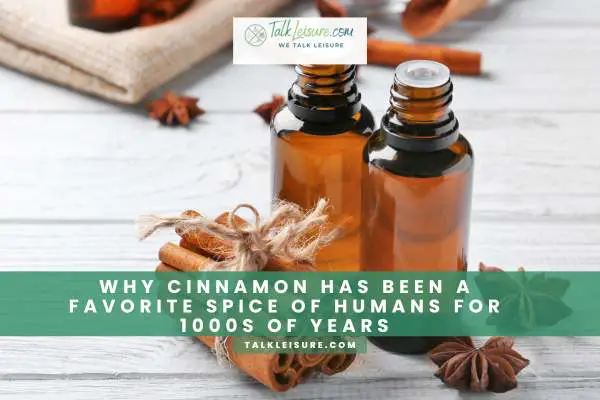
Cinnamon has been a favorite spice for thousands of years because of its fantastic taste and smell.
It has a rich history, starting with ancient Egyptians using it for embalming and considering it a precious gift from the gods.
Arab traders brought cinnamon to Europe, keeping its origins a secret due to its high value.
Cinnamon comes from the bark of the cinnamon tree, which grows in tropical areas.
The bark is rich in cinnamaldehyde, the compound responsible for cinnamon’s unique taste.
In the Middle Ages, people used cinnamon for various medicinal purposes and acted as a natural preservative for food.
The spice played a significant role in history, with stories of its use in ancient Egypt, Greece, and even in the Bible. It was highly valued in European cooking, symbolizing status in ancient Rome.
Cinnamon’s journey was marked by a “fight for cinnamon,” with trade disputes and exploration by various European powers.
Portugal, Britain, Holland, and France competed for control of the cinnamon trade, leading to its cultivation in different parts of the world.
Today, Sri Lanka produces about 90% of the world’s Ceylon cinnamon.
The global demand for cinnamon has been increasing, with the U.S. and India being top consumers.
The spice continues to be popular for its enticing aroma and diverse uses in cooking.
What Herbs Did Ancient Romans Use For Medicine?
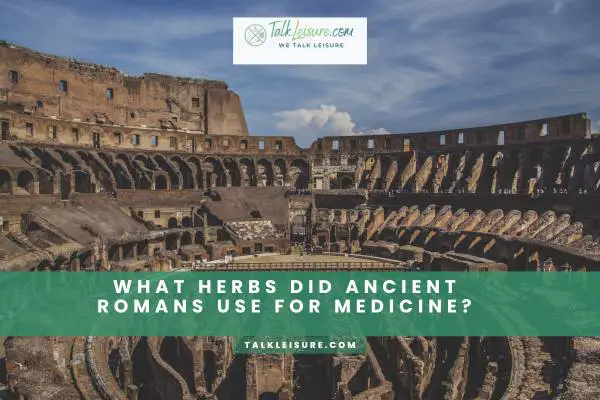
The ancient Romans were known for their impressive knowledge of medicine.
They used a variety of herbs and plants to treat a wide range of ailments.
Some of the most popular herbs used by the Romans include mint, thyme, rosemary, and chamomile. These herbs were used to treat digestive issues, headaches, respiratory problems, and even skin conditions.
One of the most commonly used herbs by the ancient Romans was garlic.
They believed that garlic had potent antimicrobial properties that could help fight off infections.
They also used cinnamon to treat digestive problems, fever, and colds.
Another popular herb was sage, which they used to improve memory and mental clarity.
The ancient Romans were also known for their use of opium and other narcotics as pain relievers.
However, they also had a deep understanding of the potential dangers and side effects of these substances, and they used them sparingly and with caution.
Overall, the ancient Romans relied heavily on the power of nature to heal, and their knowledge of medicinal herbs and plants laid the groundwork for modern medicine as we know it today.
What Was Cinnamon Used To Cure In Ancient Rome?
Cinnamon was highly valued in ancient Rome for its medicinal properties.
It was commonly used to treat digestive problems due to its ability to soothe the stomach and relieve nausea.
In addition, cinnamon was believed to have fever-reducing properties, making it an effective treatment for colds and flu.
Roman doctors also used cinnamon to alleviate menstrual cramps and arthritis pain.
The spice was applied topically as a paste, or ingested in the form of a tea, tonic or powder.
Beyond its medicinal uses, cinnamon was a valuable ingredient in perfumes and cosmetics due to its sweet and warm scent.
It was also considered a luxury item and was sometimes used as currency. Overall, cinnamon was highly prized in ancient Rome for its versatility and numerous health benefits.
What Were The Benefits Of Cinnamon In Ancient Rome?
Cinnamon was a highly valued spice in ancient Rome, not only for its sweet and warm scent but also for its medicinal properties.
Roman doctors used cinnamon to combat a plethora of ailments, including digestive issues, colds, flu, menstrual cramps, and arthritis pain.
The spice was either ingested in the form of a tea, tonic, or powder or applied topically as a paste.
The impressive healing properties of cinnamon made it an essential component in many of the medicinal remedies of ancient Rome.
Apart from its medicinal uses, cinnamon was considered a luxury item and often used as currency.
Its versatility and numerous health benefits made cinnamon a highly prized commodity in ancient Rome, and it continues to be a valuable spice to this day.
What Are The Health Benefits Of Cinnamon Scent?

The sweet and warm aroma of cinnamon has been known to improve cognitive function, memory, and attention span. It can also reduce stress and anxiety, thereby promoting relaxation.
Cinnamon smell can boost your brainpower and make you feel less tired or cranky.
It can also make it easier to breathe, which is helpful when you have a cold or the flu.
In aromatherapy, cinnamon oil is used to lift your mood, fight tiredness, and even improve your love life and immunity.
It can also ease joint and muscle pain, and when you’re sick, it may help reduce cold and flu symptoms.
Furthermore, studies have shown that cinnamon contains anti-inflammatory and antioxidant properties, which can help boost the immune system and prevent chronic diseases.
Diffusing cinnamon oil or burning cinnamon incense can help purify the air, reduce bacteria, and promote better respiratory health.
So if you want to reap these wonderful health benefits, consider incorporating cinnamon-scented candles, oils, or incense into your daily routine.
Just make sure to use high-quality and natural cinnamon products to ensure safety and effectiveness.
Final Thoughts
Cinnamon has been used for different purposes throughout history, and ancient Rome was no exception.
It was not only used as a spice for food and beverages but also for medicinal properties, perfumes, and even as a currency.
Its popularity continued to spread, and today, it remains an essential ingredient in many cuisines and fragrances worldwide.
The sweet and warm scent of cinnamon is still enjoyed for its unique aroma and therapeutic benefits.
It’s fascinating to see how a spice that was once so highly valued has managed to find its way into modern-day culture.
Regardless of its origins, cinnamon remains a timeless ingredient that continues to captivate our senses and bring joy to our lives.
FAQ
Was Cinnamon Used As Currency?
Yes, it’s true! Cinnamon was once used as currency in ancient Rome. Its popularity and value were so high that it was considered a precious commodity.
This spice was even used as a form of payment for debts or taxes, and some accounts suggest that soldiers were paid in cinnamon during the Roman Empire.
Cinnamon’s monetary value was due not only to its unique flavor and scent but also to its rarity and exotic origins.
What Spices Did The Ancient Romans Use?
Apart from cinnamon, they used various other spices, such as pepper, saffron, cumin, nutmeg, and ginger.
Pepper was particularly popular and considered to be the “master spice.” It was used in almost every Roman dish and was even used as a form of payment. The Romans also used saffron as a spice and coloring agent for their food.
Cumin was another ingredient used to enhance the aroma of dishes. Nutmeg was also used as a spice and a medicine. It was believed to have sedative properties and was often used to treat digestive issues and insomnia.
Ginger was used in sweet and savory dishes and was believed to have purifying properties.
How Is Cinnamon Used In Perfume?
Cinnamon has been used in perfumes for centuries due to its warm and inviting aroma.
In ancient Rome, cinnamon was used to create luxurious fragrances that were sought after by the wealthy.
The spice was often combined with other ingredients, such as myrrh, frankincense, and rose, to create complex and alluring scents.
It is also known for its calming and comforting properties, making it a popular ingredient in aromatherapy.
Is Cinnamon A Good Perfume Scent?
Cinnamon is an excellent perfume scent for anyone looking for a warm, inviting fragrance.
Its comforting and alluring smell makes it famous for many perfumes and colognes.
The sweet and spicy aroma of cinnamon is known for its aphrodisiac properties and has been associated with sensuality and intimacy for centuries.
It is still a common ingredient in many fragrances due to its unique scent and therapeutic benefits.
Whether used on its own or blended with other ingredients, cinnamon can add depth and complexity to any perfume while providing comfort and relaxation.
Best Wishes!

